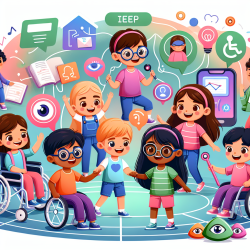Introduction
As a speech-language pathologist with a focus on data-driven decision-making, it's crucial to understand how external factors, such as climate change, can influence the vulnerability of populations, particularly in rural areas. A recent study titled "Impact of Climate Change on Rural Poverty Vulnerability from an Income Source Perspective" offers insights that can be applied to enhance online therapy services, such as those provided by TinyEYE, to improve outcomes for children in rural communities.
Understanding the Research
The study utilized climate data and micro-survey data (CHIPS2013) to examine how climate affects poverty vulnerability in rural China. The findings revealed that extreme temperatures—hotter summers, colder winters, and greater day-to-day temperature variations—reduce vulnerability to poverty. This indicates that climate change has a nuanced impact on poverty, affecting different groups in various ways. For example, vulnerable populations are more likely to fall into poverty during high temperatures, while non-vulnerable groups are less affected.
Implications for Online Therapy
For practitioners in the field of speech-language pathology, these findings highlight the importance of considering environmental factors when designing and implementing therapy programs. Here are some actionable insights:
- Customized Therapy Plans: Tailor therapy plans to account for the unique challenges faced by children in rural areas affected by climate change. This might involve adjusting session times or focusing on stress management techniques.
- Resource Allocation: Allocate resources more effectively by understanding which populations are most vulnerable to climate-induced poverty. This ensures that children who need the most support receive it.
- Community Engagement: Engage with local communities to better understand the specific impacts of climate change in their area and incorporate this knowledge into therapy sessions.
Encouraging Further Research
The study underscores the need for further research into the intersection of climate change, poverty, and therapy outcomes. Practitioners are encouraged to collaborate with researchers to explore these dynamics further. This collaboration can lead to the development of innovative strategies that enhance the effectiveness of online therapy services.
Conclusion
Incorporating insights from climate change research into speech-language pathology practices can significantly enhance therapy outcomes for children in rural areas. By understanding and addressing the unique challenges posed by climate change, practitioners can ensure that their services are both effective and equitable.
To read the original research paper, please follow this link: Impact of Climate Change on Rural Poverty Vulnerability from an Income Source Perspective: A Study Based on CHIPS2013 and County-Level Temperature Data in China.










